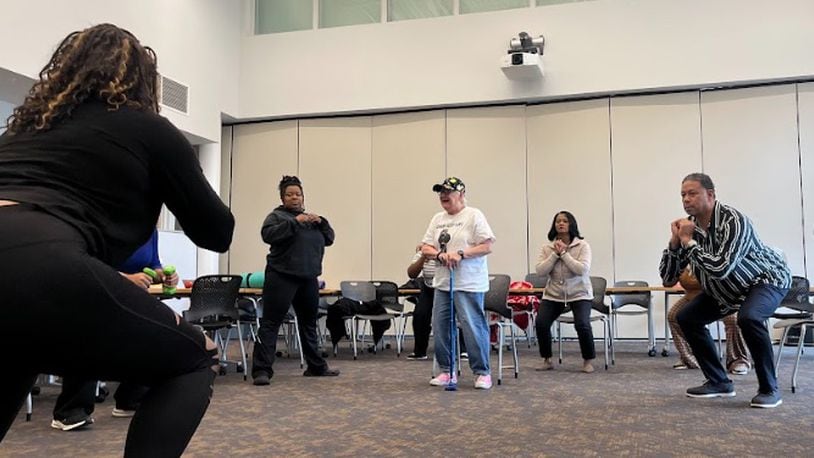“High blood pressure is known as the silent killer because there are often no signs or symptoms,” said Amy McAllister, health education specialist, Public Health – Dayton & Montgomery County.
High blood pressure can damage the arteries by making them less elastic, decreasing the flow of blood and oxygen to the heart and leading to heart disease. By providing health information, introducing exercise and presenting heart-healthy foods, the PACE program focuses on prevention.
“People know they should exercise more and eat better, but they might not know how to do it,” McAllister said. “This program includes practical exercises they can do on their own as well as heart-healthy food that is tasty and affordable.”
Through a partnership with Mission: Fit Dayton, PACE participants have been introduced to a variety of fitness classes from line dancing and chair fitness to yoga and resistance training.
“Exercise and movement are so important to the body,” McAllister said. “We need to move to be healthy, so we offer a variety of different types of exercise and all of the exercises can be modified for any fitness level.”
Program participants are also taught how to make easy, healthy meals with an air fryer and a slow cooker as well as how to read labels to avoid excess salt.
“We also introduce a lot of spice to add flavor to the healthy recipes,” McAllister said.
Two sessions of the six-week program have already been completed with two more set to begin on March 4 and April 29.
“The feedback has been really great,” McAllister said. “People really seem to enjoy the program and are getting a lot of information they need.”
For more information on the PACE program, visit www.phdmc.org.
PACE Program
Designed to help prevent heart disease and high blood pressure in the African American population by providing education on:
- What affects our heart and blood pressure.
- Introducing physical activities to get our bodies moving no matter the fitness level.
- Learning how to make flavorful and nutritious foods that are healthy for the heart.
Requirements
- Must be 18 years of age or older
- Health screenings: cholesterol, blood pressure, body mass index (BMI)
- Must pre–register and be pre-screened for high blood pressure
Session Dates
(*Dates and times subject to change)
- Group 3: 3/4/24- 4/8/24 (Evening)
- Group 4: 4/29/24 – 6/3/24 (Evening)
For questions, contact Amy McAllister at Amcallister@phdmc.org
How do cardiovascular disease risks vary by race and ethnicity?
(Cleveland Clinic)
High blood pressure (hypertension)
- 59% of Black adults have hypertension. This is the highest prevalence among all racial and ethnic groups.
- Black women are twice as likely as white women to develop chronic hypertension during pregnancy. This condition raises a person’s risk for cardiovascular disease down the road.
- Black adults are more likely than white adults to have organ damage caused by hypertension. As a result, they’re four times more likely to experience end-stage kidney disease.
- Black adults are more likely than white adults to die from hypertension and related diseases.
About the Author
